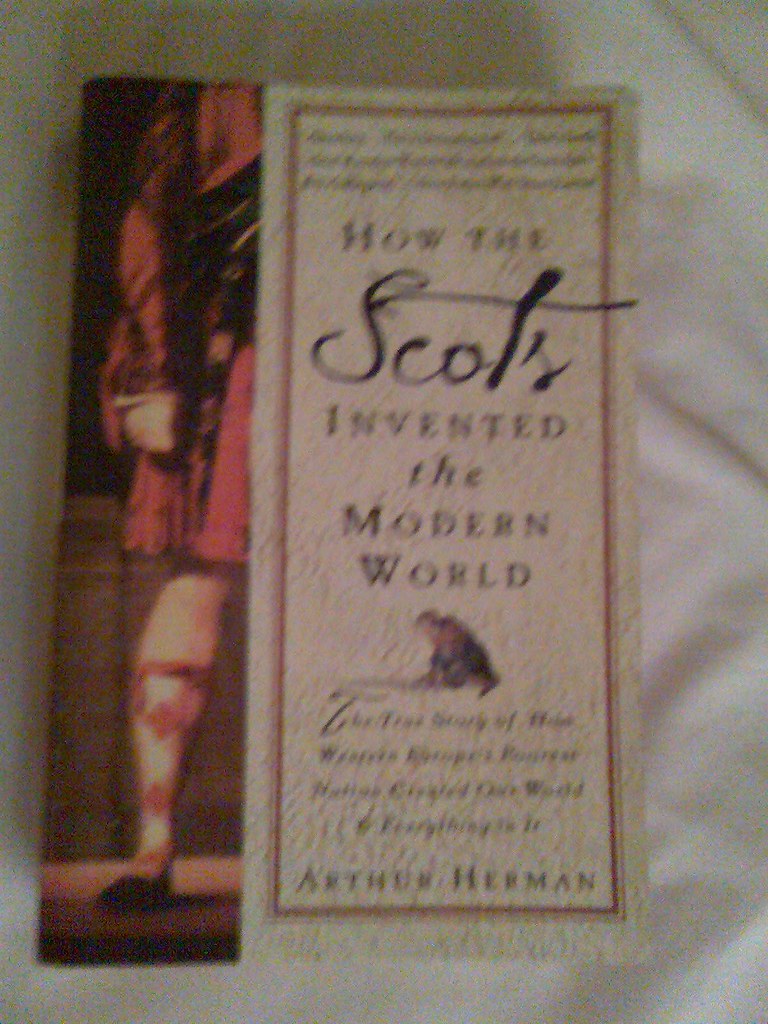
How the Scot's Invented the Modern World. Author Arthur Herman. I have just finished reading this book. A book that I would have probably never have purchased but given by chance, it was in the room I am renting in Mountain View, I decide to give it a read. And what a read. It may rate as one of my most important reads.
I have never been a fan of history. At school, Aboyne Academy, when we get the choice of subjects to take, History and Geography line up against each other and for me geography always wins. My predisposition is to vision, to looking forward, assuming each day represent a blank canvas to create the day and days ahead. Decades ago, about University days I recall reading or listening to the Winston Churchill quote, 'the further you can look back, the further into the future you can see.' Not an exact quote but words to those effects. This did seem to make some sense but I have invested very little time to history until recently.
Reading this book has allowed me to piece together a whole string of events, thoughts and some new enlightened conclusions from my free and independent thinking.
From my first trip to the United States of America, I have found that the average American I met turns out to be more Scottish than I, well they certainly know the clan or family tree trace back further than I do. Scottish history, battles, fighting with the English, Culloden, Battle of Bannock Burn, William Wallace, Robert the Bruce and locally Roy and Gilder Roy. Economics, self interest, capitalism, Adam Smith and entrepreneurship, free trade to Andrew Carnegie. This book raps together all these worlds, with history the name of the story.
With the story being a lot richer than the parts I list. I enjoyed reading about (at least the authors view) to a greater depth the series of events and people that came together at time to be recorded as history. Here is a quick summary of what my mind has selected to stand out. Religion and war. One group of people fighting another. Education, from the Churches to the Scottish School, the Enlightenment Writers, Hume, Smith and Reid. More on them later. Pioneers to new lands opening up trade, tobacco to slaves. Government, taxes to tap into the wealth creation, naval military. The observation from the Enlightenment on both fighting and trade. Overwhelming question the school of philosophers was, What is the purpose of life? Must be a better way than all this death and constant political upheaval and poor living condition for the masses.
Clubs of intellectual discussions key to wider acceptance of the society and social change set out. Not won over night, some still argue the relevance even today, more fighting and environmental events, bad winters, drive Scots to North Ireland, 'fighting for every field', the Scotch-Irish are, ships to the colonies allow escape. At the same time Scotland's chooses Union with England and Scot's rise to take leading political positions and drive the formation of the British Empire. Twice. These forces collide in the American Colonies, Scotch-Irish and some highland Scot's fight against Scot's who side with the Union. The Colonies win and the winning Scot's drive on to reach the west coast. Defeated Scot's head for Canada, a top-down socialist model is formed. The United States, live by the self interest school of enlightenment. Freedom, independence of spirit creates a grass roots created society. 1800's see the industrialist come along and perfect the practices set out by the Scottish School, Andrew Carnegie sets a formula that looks like the Global Corporations we have today. Back in Scotland, devolution has happened, Union with England still the foundation, the start of a new era of change to drive a new enlightenment era?
Further thinking on entrepreneurship. Over the last decade there has been a strong push from Scottish entrepreneurs and politicians to create a strong entrepreneurial culture. I have contributed by giving school talks. Having read this book I have been led to consider that this may not be the best strategy.
The Scottish School, the Enlightenment generation set an intellectual frame work or culture for what being a human and society were/are. They were philosophers. A set of papers that were read by the Andrew Carnegie's, Alexander Bells etc. to guide their entrepreneurial instincts.
If you make this interpretation, then it is not the teaching of entrepreneurship that should be our focus but to create an new intellectual framework that will be consumed by the enterprising.
What should or does this new intellectual framework read like? There seemed to be three main attributes of the Scottish School, The Enlightenment generation that formed the most educated nation on earth at the time. Maybe that says it all?
Hume, brought together the religious thinking with the secular thinking on what life is.
Adam Smith, observations on commerce and how the self interest of the individual and society play out.
Thomas Reid, The mind that brought us, common sense.
I think. If there is still three schools of thought that need to be brought together again they maybe.
Life demands to be lived. The next generation has the right to live too.
Commerce, capitalism has fullfilled it goals, a new 'attention' economy rules to consider e.g. economies of scale being challenged by economies of networks.
Not so much common sense, but 'unique life' that connects all to one earth.
Free and independent thinking. A school we should all belong to.


No comments:
Post a Comment